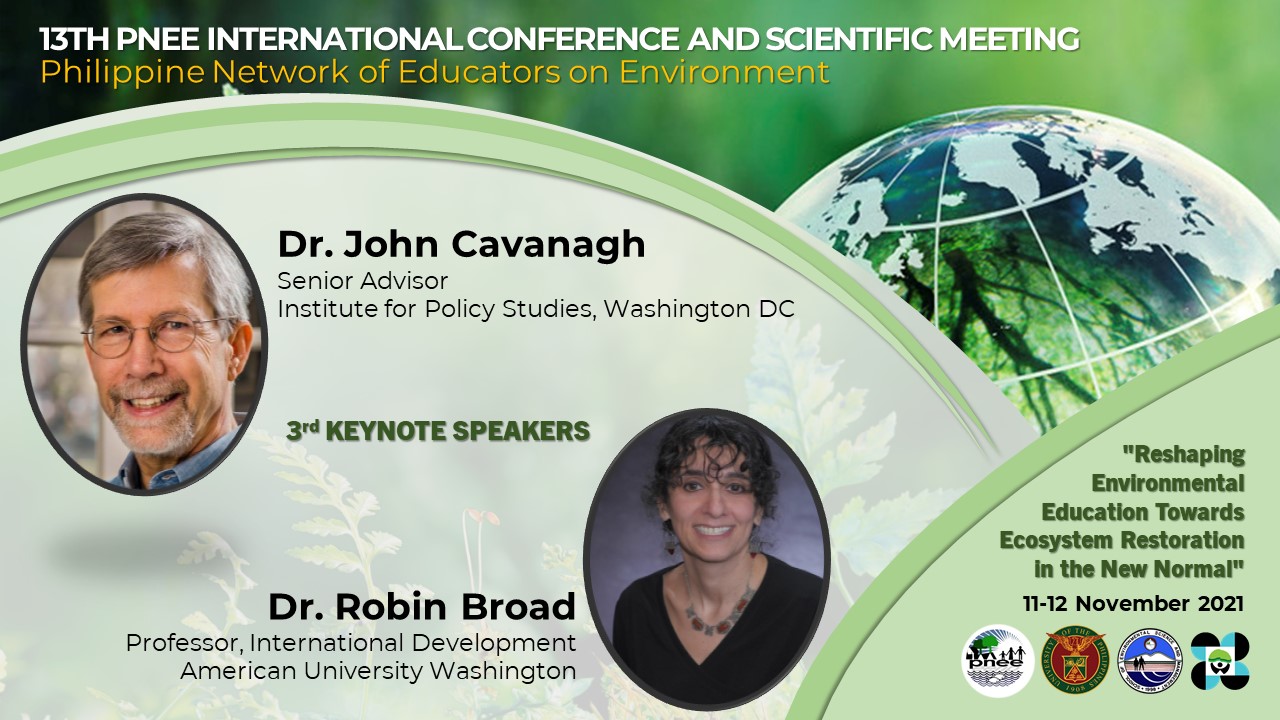
“In addition to being a natural resources superpower, the Philippines is also a social movement superpower. On any given environmental issue, the Philippines have a diversity of non-governmental organizations, local community groups, and coalitions. These organizations will be the key to success in order to achieve transformational change” – Dr. John Cavanagh
With the theme “Reshaping Environmental Education Towards Ecosystem Restoration in the New Normal”, the 13th PNEE International Conference became a platform to convene various ideas to address existing environmental issues. Dr. Robin Broad and Dr. John Cavanagh, authors of a landmark book “Plundering Paradise: The Struggle for the Environment in the Philippines”, joined the dialogue by presenting their insights and suggesting key action points to call for community action towards the resolution of various environmental issues. By presenting the case of El Salvador and the role of communities serving as medium to promote social change in the context of mining, Dr. Broad and Dr. Cavanagh presented four points on the role of environmental education to steer social change to address environmental issues.
First, social movements play a major role as the backbone in navigating actions on existing environmental advocacies. In the case of El Salvador, the active participation of communities steered the anti-mining movement, prompting the action towards its eventual banning. Next, Environmental Education is an important medium to redirect various sectors to act on urgent issues and call for participation. There is an urgent need to bridge the communication gap among various sectors to educate various individuals on the ground-level dynamics governing these environmental issues. To do this, multidisciplinary approaches are effective means to communicate the importance of various environmental initiatives. Thirdly, more positive messages based on values and basic rights should be delivered to audiences using various mediums to encourage action. Although in the past, messages are being delivered in the context of the adverse damage of actions, it is also important to highlight positive messages to reflect the lasting values of actions and its implication to individual human rights. Lastly, educating and building alliances among likely and unlikely stakeholders is necessary to echo the call towards social action. Unlikely allies can be found among small businesses and non-government organizations. Rallying behind anti-mining advocacies, the Church became an unlikely ally in the case of El Salvador primarily due to the academic background.
With these major points presented, Dr. Enrique Pacardo, Professor Emeritus of SESAM, along with Dr. Decibel Eslava, SESAM’s very own renowned geologist, joined the dialogue. Dr. Pacardo emphasized that the landscape in El Salvador as discussed by Dr. Broad and Dr. Cavanagh may be different in the case of the Philippines which is an archipelagic country. Still in the context of mining, Dr. Eslava expounds on this by describing how it is important to seek the balance between achieving the growth of local economies reliant on the mining industry and policing measures to facilitate industries to go beyond mere compliance. In the case of the Philippines, it is important to be vigilant and at the same time open for opportunities to facilitate the economic development of communities relying in the mining sector.
Further, a consensus was achieved in the context of providing ground level information to appropriately account for the long term costs and benefits associated with various interventions including mining. In conclusion, Dr. Robin Broad and Dr. Cavanagh urged the participants to seek means to borrow insights from educators and environmentalists around the world in order to address existing environmental dilemmas. With our existing natural resources at stake, it is also important to appropriately address these concerns with ground level information as the cutting edge weapon to steer various social movements.The two-day virtual conference was organized by the PNEE (formerly EENP) which aims to promote sustainable development through a strong and independent network of Philippine institutions. The UPLB-SESAM has taken the lead in the foundation of PNEE and has been serving as its permanent secretariat. At present, PNEE has 92 institutional members (state universities and colleges and non-government organizations) and 785 individual members (faculty, and researchers) throughout the Philippines (Stellah Grace Aclan and Clarissa Lontoc).

